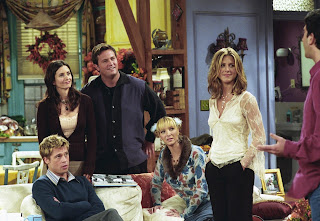By Michael Lyons
Ah Thanksgiving, the holiday that’s been eclipsed by our zeal to hurtle headlong into Christmas. But, what’s not to love about a day filled with helium balloon versions of the latest cartoon fads, tables packed with food, gathering with those close to us and sitting in front of the TV in a tryptophan coma?
Just like Christmas, Thanksgiving is a day that we desperately want to be perfect...but sometimes, well...it isn’t.
Few TV shows captured everything about Thanksgiving, and how it can be so imperfect at times, like “Friends.”
One of the ‘90’s most popular sitcoms, centering on a group of twenty somethings in New York City, left its indelible mark on television and pop culture . “Friends” also had a recurring, annual tradition: a new Thanksgiving episode each year.
This fall marks the 25th anniversary of when “Friends” first debuted on NBC, making this the perfect Holiday Season to look back at each Thanksgiving episode from the blockbuster show’s ten seasons.
Season One: “The One Where Underdog Gets Away.” The annual episode tradition started off hilariously with the best of the Holiday episodes. Monica cooks Thanksgiving dinner for the gang, but when they learn that the Underdog balloon has broken loose from the Macy’s Thanksgiving Day Parade, they all run to the roof, locking themselves out of the apartment. Dinner, of course, is ruined and they settle for Chandler’s “anti-Thanksgiving dinner” of grilled cheese, but find themselves happy that they’re still all together.
Season Two: “The One With the List.” Monica lands a job creating food for a company that’s developed a chocolate substitute and Ross creates a list of his dream celebrity “crushes.” Thanksgiving happens simply as the backdrop of this one and it’s probably the least Holiday of all of the episodes.
Season Three: “The One with the Football.” Monica and Ross’ competitive nature and poor sportsmanship have hilarious results as the gang takes a break from Thanksgiving dinner to play football in a nearby park.
Season Four: “The One with Chandler in a Box.” Monica, who had just broken up with Richard, the older man she had been dating, invites his son over for Thanksgiving dinner. Meanwhile, Chandler agrees to spend Thanksgiving in a wooden box, while the gang eats dinner, as punishment for cheating with Joey’s girlfriend. There’s great Chandler/Joey dialogue and dynamic here, with a surprisingy sweet and poignant ending.
Season Five: “The One With All the Thanksgivings.” We “flashback” to the friends’ Thanksgivings past - many of them in the ‘80’s, filled with Flock of Seagulls haircuts, “Miami Vice” suits, Rachel’s original nose, Monica before her weight loss and hilarious results.
Season Six: “The One Where Ross Gets High.” Ross and Monica’s parents join the friends for this Thanksgiving, where past secrets are revealed and Rachel creates the world’s most disgusting trifle. Filled with non-stop, dizzying and interwoven stories, this episode plays like and ingenious screwball comedy.
Season Seven: “The One Where Chandler Doesn’t Like Dogs.” During Thanksgiving, we learn that Phoebe has been sneaking a dog into the apartment and that Rachel has feelings for her much younger assistant. There’s also classic Joey dialogue here, as he names “all 56 states,” during a challenge by Chandler.
Season Eight: “The One With The Rumor.” Brad Pitt (Jennifer Anniston’s real-life husband at the time) guest stars as an old high school friend who Monica invites to Thanksgiving dinner. The gang learns that he hated Rachel in high school, started a “I Hate Rachel Green Club” and also started a rumor about her that is too hilarious to be spoiled here.
Season Nine: “The One With Rachel’s Other Sister.” Christina Applegate is very funny, guest starring as Rachel’s sister Amy, who shows up for Thanksgiving dinner and winds up insulating every single friend with some hysterical interactions with Phoebe.
Season Ten: “The One With the Late Thanksgiving.” “Friends” went out with a Thanksgiving bang in their last season. Phoebe and Rachel sneak out to enter Rachel’s daughter Emma in a baby beauty pageant, while Ross and Joey sneak out to a Rangers game. When they all show up late to Thanksgiving dinner, Monica refuses to let them into the apartment.
Just as tensions run high, Monica and Chandler learn that they are expecting a baby through the adoption agency, in a very sweet finale.
While “Friends” may have ended their run almost fifteen years ago, it lives on in rerun heaven. Many fans have a tradition of their own where, on or around Thanksgiving Day, they will binge all of the Holiday’s episodes.
So, when it comes to Thanksgiving, “Friends” will “Be There For You!”
Happy Thanksgiving to all!
Sources:
IMDb
Parade Magazine: “Our Ultimate Ranking of Friends Thanksgiving Episodes”









